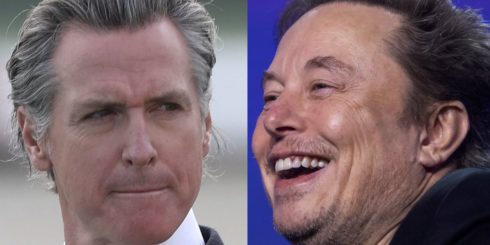California Governor Gavin Newsom has escalated his ongoing feud with Tesla CEO Elon Musk, threatening legal action over the tech mogul’s use of memes and deepfakes. Gavin Newsom’s concerns center on the potential harm these materials pose to democracy, claiming they undermine the integrity of elections. This confrontation follows Gavin Newsom’s recent signing of bills aimed at curbing the spread of digitally manipulated images and videos in political ads, including AI-generated deepfakes.
Musk, however, has taken a different stance, accusing Gavin Newsom of “making parody illegal.” In response to the governor’s legal threats, Musk posted a sarcastic comment on social media, remarking, “Amazing,” underscoring the deep ideological rift between the two on the issue of AI and free expression in political discourse.
Gavin Newsom’s New Law on AI and Political Ads
Earlier this week, Governor Gavin Newsom signed what he described as the “toughest law” in the United States aimed at combatting political deepfakes. The law prohibits the creation and distribution of AI-generated deepfakes within 120 days before and 60 days after Election Day. The legislation also grants courts the authority to halt the dissemination of such content and impose civil penalties on violators.
Gavin Newsom emphasized that protecting election integrity is a cornerstone of democracy. “We must ensure AI is not used to deceive voters and undermine public trust,” he said in a statement. The new law is part of a broader effort by California to regulate the increasing influence of AI on elections, with the state having previously pioneered similar measures in 2019.
Musk Fires Back: Accusations of Censorship
Elon Musk wasted no time responding to the new law and Gavin Newsom’s remarks, accusing the California governor of attempting to stifle free expression. Musk shared a deepfake video of Vice President Kamala Harris and claimed that Newsom’s legislation was essentially “making parody illegal.” His posts, filled with laughing emojis, underscored his belief that the law overreaches and could restrict harmless satirical content.
The SpaceX CEO has also criticized similar legislative efforts in the UK, stating that both the UK Labour Party and the U.S. Democrats are “ACTUALLY trying to make posting memes illegal.” This rhetoric has only heightened tensions, with Musk’s followers rallying behind him, further fueling the public debate over the fine line between parody, deepfakes, and disinformation.
California’s Leadership in AI Regulation
California has positioned itself as a national leader in AI regulation, with Gavin Newsom boasting about the state’s proactive stance in managing AI’s impact on politics. The governor has pointed out that laws implemented in California are often used as blueprints for similar regulations across the U.S., particularly those aimed at safeguarding elections from digital manipulation.
In addition to the deepfake legislation, Gavin Newsom signed a bill requiring political campaigns to disclose whether any of their ads contain AI-generated materials. These moves are part of a larger regulatory framework that California is building around AI, as the state grapples with its potential benefits and Gavin Newsom noted that AI could be utilized for public good, such as reducing traffic congestion, but warned that unchecked AI use, especially in elections, poses a significant threat to democracy.
Concerns About Musk’s Political Influence
The ongoing feud between Newsom and Musk has raised concerns about the potential impact Musk’s social media activity could have on upcoming U.S. elections. Musk, who owns the social media platform X (formerly Twitter), has 200 million followers and significant influence on public discourse. Some lawmakers and public officials worry that Musk’s platform, combined with his personal political endorsements, could amplify disinformation and manipulate public trust as Election Day approaches.
Recent posts by Musk, including claims about voter registration fraud and controversial comments about civil unrest in the UK, have sparked outrage from officials who argue that Musk’s words are misleading and dangerous. With Musk now publicly endorsing former President Donald Trump and expressing interest in leading a government commission if Trump is re-elected, the stakes surrounding his influence on U.S. elections continue to rise.














